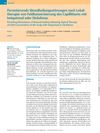Topical Diclofenac 3% Gel for Actinic Keratosis May Induce Terminal Hair in Male Androgenetic Alopecia: A Report of Three Cases
December 2015
in “
Journal of skin and stem cell
”

TLDR Using a gel called Diclofenac can potentially cause hair to grow back in bald spots in older men.
In 2015, a study was conducted on three male patients with actinic keratosis (AK) and androgenetic alopecia (AGA), who were treated with topical 3% diclofenac gel. The patients, aged 73, 77, and 79, showed terminal hair growth on previously bald areas of the scalp after four to six months of treatment. The authors hypothesized that the inhibition of the COX-2 enzyme by diclofenac might act over the perifollicular micro-inflammation and the prostaglandins imbalance observed in AGA, leading to hair growth. This was the first reported case of hair growth due to topical diclofenac treatment. However, the study had limitations including the small number of patients and lack of laboratory testing or specific imaging surveys. Further research was suggested to confirm these findings and explore the mechanisms of micro-inflammation and prostaglandins regulation in AGA.










